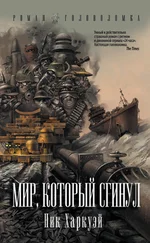He worried about the boy as he drove, and about what would happen to the remaining civilians when the island was eventually purged. It had bothered him from the beginning, but more and more as time went by and the inevitable end drew closer. He had seen refugee columns and resettlement camps around the world, and he did not care to imagine what the boy would become by living in one. A warlord, in the end, or a corpse. Such places did not admit of middle ways. The joy would be cut from him, for sure.
The Sergeant had a plan to deal with that crisis if – when – it arrived, but he was still working out the detail. There were preparations he had to make, investigations he had been conducting quietly for some time. But he had not actually put the plan into action, and he had not spoken to the boy about it. There were good reasons. Sound reasons.
He braked again to go around another impossible bend, avoiding his own eyes in the mirror. None of these reasons was a lack of resolve on his part, or a lack of personal courage. He was almost sure.
The town and the port spread out below him, the invisible ships surprisingly close to the land. He felt his eyes flick away. Everyone found ways not to see what was in the bays. The Fleet could have painted itself pink or burned to the waterline, and no one would have remarked upon it. People saw the harbour and the horizon and nothing in between. Even the fishermen who went out and zipped in between the big vessels, selling fresh fish and crab, and the traders on junkboats who bought and sold DVDs and Coca-Cola and fresh meat and anything else they could lay hands on – even they had a strange amnesia about which ships they visited. It wasn’t feigned. It was a habit so totally ingrained as to have become part of reality. The enormous ships were a fact of life, and it was a fact that you couldn’t see them.
As with everything else, the boy was an exception. He bartered with the ship captains, argued with them loudly and crudely, demanded – and received – favours, tours, T-shirts, and team hats. He had a Delta Force hat, and a Real Madrid jacket, and a signed copy of something called Transmetropolitan which the Sergeant understood by the jubilation it had entailed to be a major coup. The boy had won them at dice or paid for them with gossip or simply asked for and received them. It seemed the captains admired his cheek, or maybe they were just desperately grateful for someone who acknowledged their existence. It didn’t matter how tough you were, how psychologically motivated. It hurt to be invisible, even if that was the whole point.
Like Diego Garcia, of rendition infamy, Mancreu had been found new uses by democratic governments wishing to avoid the consequences of their own inconvenient liberties, and by corporations seeking relief from the onerous duties of civilisation. The border on the map had been softened and in places entirely cut away, so that a strange zone of legal limbo was created between the breakers and the three-mile limit. In this maritime twilight it was often hard to tell where nations ended and other entities began; where corporate activity shaded into organised crime, spying into a trade in unlawful commodities. Clustered across the Cupped Hands lay a mass of unaffiliated shipping: prisons for deniable detainees and hospitals for unethical procedures; data havens, grey banks, untaxed subsidiaries; floating harems and forced-labour factories, auction houses for contraband goods; torture facilities for hire. So long as it never touched the shore, the business of the Fleet was invisible.
When the storms came in above the southern mountains, the ships drew apart from one another so that covert prows didn’t gouge holes in unacknowledged hulls; so that secret masts didn’t scythe across false-flag decks. When the weather abated, they huddled, so they could share cable television connections to the land and shout news to one another from deck to deck. American intelligence officers and their corporate-side cousins traded Sara Lee brownies with Poles for vodka and Frenchmen for cigarettes. Brits gave up HumInt and lapsang souchong and bought red wine and fresh milk, and sometimes played cricket on a long, lean supertanker moored forever at the northernmost limit of the zone. And all of them traded snippets of information to the Mafia and the Triads in exchange for occasional housekeeping jobs, ex gratia hookers and something to read. And the crooks were good for vanishings, when an interrogation grew heated and a subject expired from his own ignorance. On other deployments the Sergeant had occasionally seen that sort of thing written up by contractors as self-injurious passive psychological attack culminating in asset compromise . But here, on the ships of the Black Fleet, those terms of art were unnecessary. So long as the Fleet kept its activities to the waters of Mancreu, no reports were ever written. Intelligence was sourceless, all analysis was done on site and only the pure information ever emerged. The Rule of Law within the territory of the western democracies was preserved, and the conscience of ministers was notionally clean. Mancreu was a tapestry of questions unasked, because the answers were obvious. It had been going on for so long now that, at least to a global press whose owners sipped Chardonnay with prime ministers, it was no longer distressing.
The Sergeant turned the wheel and felt the beginnings of a skid; the road surface was covered in scree and shale. He allowed the car to drift a little, enjoying the play of the tyres and the tarmac, then straightened up and let his route take him in amongst the narrower streets.
Kershaw – his first stop, out of politeness – was not available, which meant the American was probably receiving information or instructions. The Sergeant left a message at the desk with a promise to come back later. He went over to the harbour and Beneseffe showed him the scene of the great fish theft, which was predictably stinky but otherwise not terribly helpful. A fully staffed crimes unit could have taken fingerprints and statements, worked out who had used the winches and the hauler. It would still have been almost impossible to learn much from the physical evidence because everyone likely to have committed the crime was allowed to use the equipment. It was remotely possible that someone not from the port had sneaked in, known how to work everything, gone off with the fish. But that person would then have to dispose of the fish, and how precisely would a shepherd explain his sudden good fortune? Had they fallen as rain? (And on Mancreu in particular: if they had, would anyone buy them?)
It seemed unlikely that this crime would remain mysterious for very long. There was a limited number of things you could do with four tons of fresh fish.
Pursuant to his other investigation – the one which related to his long-term solution for the boy’s evacuation – the Sergeant asked Beneseffe casually if he knew who his friend’s parents were.
‘Which boy?’ the Portmaster responded.
‘The one who’s always around. Comic books and a big old cellphone. Slim, dark hair. Smart.’
For a moment he thought Beneseffe might actually be able to tell him. There was a flicker of recognition in his face. Perhaps it was common knowledge. That boy who was orphaned in the storm of ’02, whose parents died of a fever, who survived the car crash back in ’09 . Perhaps this would be simple. But Beneseffe shook his head. There were a lot of boys on Mancreu, even now. ‘Ask at the schoolhouse,’ he suggested.
‘He doesn’t go to school.’
‘If he doesn’t and he should then they’ll know who he is, won’t they?’ Beneseffe pointed out, his tone implying that if this was detective work he considered it easier than people believed.
Читать дальше








![Ник Харкуэй - Гномон [litres]](/books/400023/nik-harkuej-gnomon-litres-thumb.webp)



